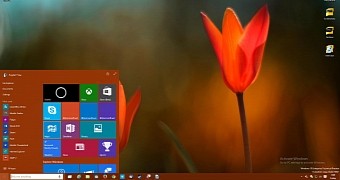Windows 10, which is going to launch in the second half of 2015, will be offered as a free upgrade within the first year of availability to users running Windows 7 or Windows 8.1 on their computers.
Needless to say, when Microsoft made this announcement during its January 21 event at the Redmond headquarters, everyone believed that the offer would be limited to those running a genuine copy of Windows on their computer, and it's no surprise why.
Microsoft has been fighting against piracy for years, so giving such an opportunity to those who purchased a valid license for Windows is more like a reward.
But recently, a statement released by Terry Myerson, head of the OS division at Microsoft, not only that took everyone by surprise but also created more confusion among Windows users.
“Windows 10 likely to reach RTM in June and launch in August.”
Myerson said in an interview that Windows 10 would be offered free of charge for genuine and non-genuine computers, making everyone believe that Microsoft was planning to make the new operating system available free of charge to basically everyone out there, including pirates.
There's no doubt that giving pirates a free copy of Windows 10 would be surprising, but at some level, it actually makes sense. If Microsoft wants to reduce the number of pirated copies of Windows, why not offer pirates the chance for a fresh start and allow them to switch to a valid license?
But this isn't going to happen. In a statement we received yesterday, Microsoft actually explains that, while pirates will get the upgrade to Windows 10 for free, a license won't be offered. This means that everyone can upgrade to Windows 10 without paying a single cent, but a pirated copy of Windows 7 or Windows 8.1 won't become genuine after deploying the new operating system.
Setting things clear
Microsoft has provided a more detailed statement today to explain what it actually meant when it said that Windows 10 could be free for pirates (emphasis is ours):
“The consumer free upgrade offer for Windows 10 applies to qualified new and existing devices running Windows 7, Windows 8.1, and Windows Phone 8.1. Some editions are excluded from the consumer free upgrade - including Windows 7 Enterprise, Windows 8/8.1 Enterprise, and Windows RT/RT 8.1. Active Software Assurance customers in volume licensing have the benefit to upgrade to other Windows 10 enterprise offerings.
We have always been committed to ensuring that customers have the best Windows experience possible. With Windows 10, although non-Genuine PCs may be able to upgrade to Windows 10, the upgrade will not change the genuine state of the license.
Non-Genuine Windows is not published by Microsoft. It is not properly licensed, or supported by Microsoft or a trusted partner. If a device was considered non-genuine or mislicensed prior to the upgrade, that device will continue to be considered non-genuine or mislicensed after the upgrade. According to industry experts, use of pirated software, including Non-Genuine Windows, results in a higher risk of malware, fraud (identity theft, credit card theft, etc), public exposure of your personal information, and a higher risk for poor performance or feature malfunctions.”
In fewer words, if you have a pirated version of Windows 7 or Windows 8.1, yes, you'll be allowed to upgrade to Windows 10, but that doesn't change anything. Your copy of Windows (10) will still be pirated, so you won't benefit from the same experience as a user who actually purchased a license.
“Upgrading to Windows 10 will be optional, so make sure you know what to expect.”
What happens next is, however, still an enigma for all of us. Microsoft might be trying to convince Windows 10 users to upgrade from a pirated version of Windows and to actually purchase a genuine license in different ways, including the typical notification messages that were implemented in older versions of Windows and by blocking access to specific features (such as the desktop wallpaper).
Needless to say, periodic reboots are also possible after a while, so if you're running a cracked copy of Windows and you plan to update to Windows 10, prepare for the worse.
Obviously, getting Windows 10 absolutely free of charge is not yet possible, although that would really be a great way to boost the market share of the new OS and convince more users to replace their old computers with next-gen ones that would also run the upcoming software.
Maybe launching a stripped-down version of Windows 10 that would be available free of charge for everyone wouldn't be such a terrible idea after all...

 14 DAY TRIAL //
14 DAY TRIAL //